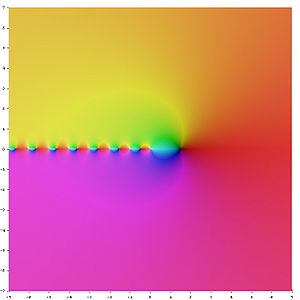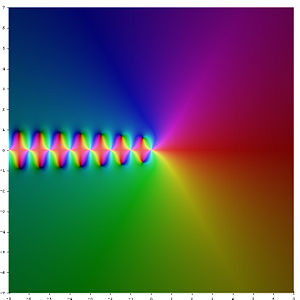
Polygamma function
Encyclopedia
In mathematics
, the polygamma function of order m is defined as the (m + 1)th
derivative of the logarithm of the gamma function
:

Here

is the digamma function and is the gamma function. The function
is the gamma function. The function  is sometimes called the trigamma function
is sometimes called the trigamma function
.

which holds for Re z >0 and m > 0. For m = 0 see the digamma function definition.

gives

for , and, for
, and, for  , one has the digamma function:
, one has the digamma function:


which holds for m > 0 and any complex z not equal to a negative integer. This representation can be written more compactly in terms of the Hurwitz zeta function as

Alternately, the Hurwitz zeta can be understood to generalize the polygamma to arbitrary, non-integer order.
One more series may be permitted for the polygamma functions. As given by Schlömilch,
 . This is a result of the Weierstrass factorization theorem
. This is a result of the Weierstrass factorization theorem
.
Thus, the gamma function may now be defined as:

Now, the natural logarithm
of the gamma function is easily representable:

Finally, we arrive at a summation representation for the polygamma function:

Where is the Kronecker delta.
is the Kronecker delta.
at z = 1 is

which converges for |z| < 1. Here, ζ is the Riemann zeta function. This series is easily derived from the corresponding Taylor series for the Hurwitz zeta function. This series may be used to derive a number of rational zeta series
.
Mathematics
Mathematics is the study of quantity, space, structure, and change. Mathematicians seek out patterns and formulate new conjectures. Mathematicians resolve the truth or falsity of conjectures by mathematical proofs, which are arguments sufficient to convince other mathematicians of their validity...
, the polygamma function of order m is defined as the (m + 1)th
derivative of the logarithm of the gamma function
Gamma function
In mathematics, the gamma function is an extension of the factorial function, with its argument shifted down by 1, to real and complex numbers...
:

Here

is the digamma function and
 is the gamma function. The function
is the gamma function. The function  is sometimes called the trigamma function
is sometimes called the trigamma functionTrigamma function
In mathematics, the trigamma function, denoted ψ1, is the second of the polygamma functions, and is defined byIt follows from this definition thatwhere ψ is the digamma function...
.
 |
 |
||||
 |
 |
 |
 |
 |
 |
Integral representation
The polygamma function may be represented as
which holds for Re z >0 and m > 0. For m = 0 see the digamma function definition.
Recurrence relation
It has the recurrence relationRecurrence relation
In mathematics, a recurrence relation is an equation that recursively defines a sequence, once one or more initial terms are given: each further term of the sequence is defined as a function of the preceding terms....

Multiplication theorem
The multiplication theoremMultiplication theorem
In mathematics, the multiplication theorem is a certain type of identity obeyed by many special functions related to the gamma function. For the explicit case of the gamma function, the identity is a product of values; thus the name...
gives

for
 , and, for
, and, for  , one has the digamma function:
, one has the digamma function:
Series representation
The polygamma function has the series representation
which holds for m > 0 and any complex z not equal to a negative integer. This representation can be written more compactly in terms of the Hurwitz zeta function as

Alternately, the Hurwitz zeta can be understood to generalize the polygamma to arbitrary, non-integer order.
One more series may be permitted for the polygamma functions. As given by Schlömilch,
 . This is a result of the Weierstrass factorization theorem
. This is a result of the Weierstrass factorization theoremWeierstrass factorization theorem
In mathematics, the Weierstrass factorization theorem in complex analysis, named after Karl Weierstrass, asserts that entire functions can be represented by a product involving their zeroes...
.
Thus, the gamma function may now be defined as:

Now, the natural logarithm
Natural logarithm
The natural logarithm is the logarithm to the base e, where e is an irrational and transcendental constant approximately equal to 2.718281828...
of the gamma function is easily representable:

Finally, we arrive at a summation representation for the polygamma function:

Where
 is the Kronecker delta.
is the Kronecker delta.Taylor series
The Taylor seriesTaylor series
In mathematics, a Taylor series is a representation of a function as an infinite sum of terms that are calculated from the values of the function's derivatives at a single point....
at z = 1 is

which converges for |z| < 1. Here, ζ is the Riemann zeta function. This series is easily derived from the corresponding Taylor series for the Hurwitz zeta function. This series may be used to derive a number of rational zeta series
Rational zeta series
In mathematics, a rational zeta series is the representation of an arbitrary real number in terms of a series consisting of rational numbers and the Riemann zeta function or the Hurwitz zeta function...
.

